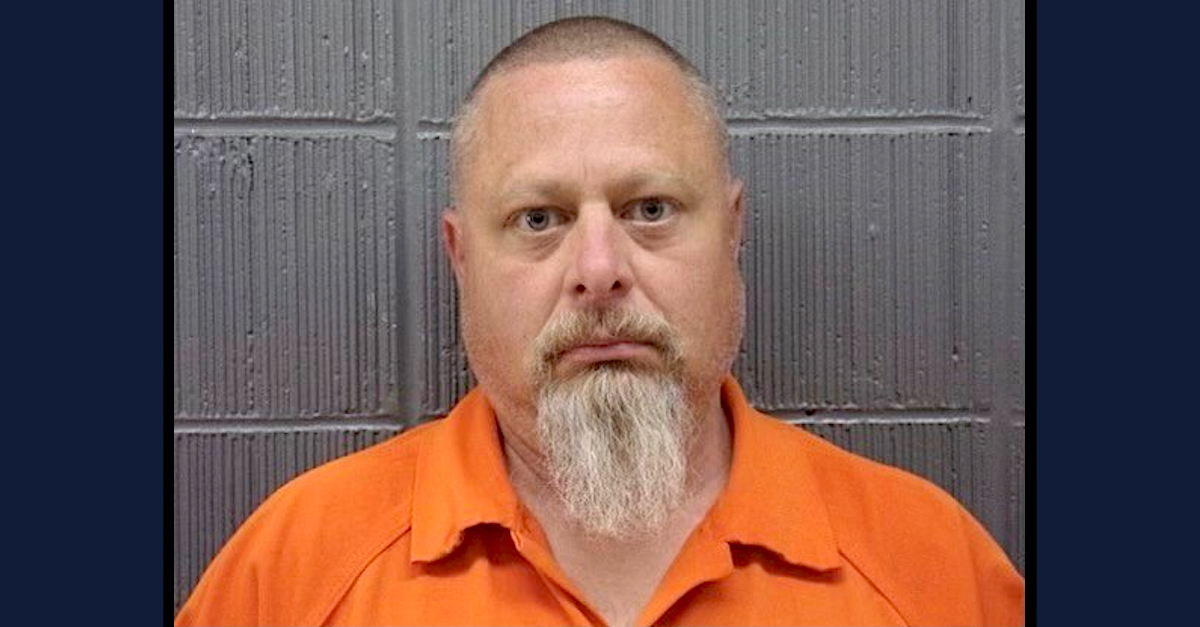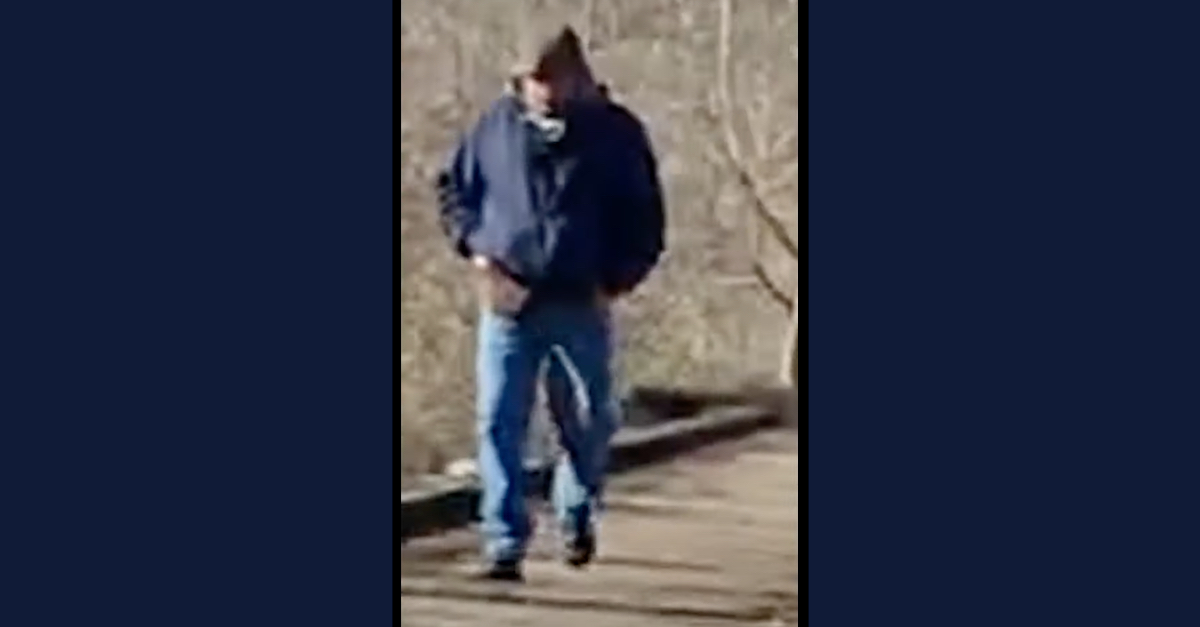
Richard M. Allen. (Image via mugshot.)
The judge overseeing the double murder case of Richard M. Allen, 50, of Delphi, Indiana, has issued an order recusing himself from the case, according to the sparse and scant public court docket in the matter. The decision to step away from the high-profile matter by Carroll County Circuit Court Judge Benjamin A. Diener came one day after the judge reportedly bemoaned to judicial branch officials — and, interestingly, to an Indianapolis television station — about the pressures connected to the case.
The recusal order is noted in a terse entry on the docket dated Thursday, Nov. 3. It adds that a certification was submitted to the Indiana Supreme Court “for Selection of a Special Judge Outside of Carroll County” to hear the case.
The Indianapolis Star reported that the state’s highest court was “in the process of appointing Allen County Judge Fran Gull as special judge in the case,” according to court spokesperson Kathryn Dolan.
Allen County, which surrounds Fort Wayne, is about one hour and 45 minutes east-northeast of Delphi, where the infamous Feb. 13, 2017 Delphi Murders of Libby German and Abby Williams occurred.

Abigail “Abby” Williams. (Image via the FBI.)
The two young teens — Libby was 14, Abby was 13 — were found dead near an old railroad deck girder bridge that is now a recreational trail. Authorities at local, state, and national levels have begged for tips for years while holding virtually all of the evidence in the strictest of confidence. However, the authorities did release a few terse seconds of a recording made by victim Libby German herself.

Liberty “Libby” German. (Image via the FBI.)
“Guys, down the hill,” says a mysterious and allegedly threatening man wearing jeans, a hat, and a blue jacket.
The authorities have long indicated that they believe German recorded a key suspect in her eventual murder.

A man appeared on a brief video clip recorded by Libby German before she died. The FBI and local authorities released only a few seconds of the recording and a short clip of what is believed to be the man depicted here saying “guys, down the hill.” (Image via the FBI.)
Under the Indiana Code of Judicial Conduct, Rule 2.11 to be precise, judges can disqualify themselves for a variety of reasons. (The “comments” section of that Rule — which is an official yet marginally less weighty guidance on how to interpret the Rule itself — says “disqualification” is synonymous with “recusal,” but Indiana prefers the former, not the latter term for the process.).
Among the reasons — which are not atypical — are when “the judge’s impartiality might reasonably be questioned,” including when “personal bias or prejudice” is afoot or when the judge’s spouse or relatives are connected to the case at hand. Additional reasons for disqualification include conflicts of interest. Those occur when a judge has served as an attorney or other advocate in the case; when a judge is a material witness in the proceeding; or when a judge accepts an appellate appointment and is asked to consider a case he handled as a trial attorney.
If a judge disqualifies himself for “bias or prejudice” or for a conflict of interest, he need not provide a reason for the disqualification, according to Rule 2.11. Other forms of disqualification, such as a financial interest in the case, do require a judge to provide a reason for seeking to extricate himself from the proceeding at hand.
It’s unclear precisely why Judge Diener stepped away from the Allen case.
However, his decision to entirely avoid the case came just one day after Indianapolis NBC affiliate WTHR reported that Diener copied the television station on an email chain with Dolan, the court system’s public information officer, to complain about the attention the case was generating.
WTHR said it filed an Indiana Access to Public Records Act request for details about the case because the entire docket — not just the charging materials and the attached probable cause affidavit — was sealed. The sealing of the charging paperwork is allowed under Indiana law under what the law itself calls “extraordinary circumstances.” Accordingly, it is unusual, and the law requires notice to be provided when it does happen and for a public hearing to be scheduled to ascertain whether the seal is necessary.
Judge Diener replied to the TV station by forwarding a chain of emails between himself and Dolan.
“From a PR standpoint, I am concerned that there is a sealed case with no cause number available (or known publicly), no PC, and no public hearing date to determine if the record should be sealed,” Dolan had written to the judge, according to WTHR. “I do suggest the court be clear with procedural information on what is public and when or why (according to the rule) it is not public.”
The law contemplates the sealing of individual records, but keeping an entire docket sealed after a defendant is arrested is a more troublesome scenario, as Dolan pointed out. By way of comparison, in the federal court system, dockets and charing paperwork generally become public after a defendant is arrested, though sometimes the paperwork is partially redacted — especially in a multi-defendant case. The legal rationale for such openness is this: while charges and affidavits can remain secret while the police and prosecutors build a case, the act of arrest is a considerable restraint on personal liberty — which is guaranteed under the Fifth and 14th Amendments — and must therefore not be done in secret.
Dolan’s advice, according to the TV station, was for Diener to be transparent.
“The press will continue asking for information to be made public,” Dolan reportedly continued. “While that does not mean the information is public (or should be public), I do suggest the court be clear with procedural information on what is public and when or why (according to the rule) it is not public.”
Judge Diener reportedly responded by complaining that his court reporter was a brand new hire, that his “bailiff answers the phone” and “has no experience and no knowledge about legal process,” and that his court administrator had to split her duties with other courts.
“That is it,” Judge Diener wrote to Dolan, again according to WTHR’s report. “So. I am begging for some assistance to shield me, the Court, from this storm so that I, the Court, can keep running the Court.”
“Otherwise, I’ll do what?” the judge reportedly continued. “Read to everyone Rule 6A of Indiana Rules of Court: Rules on Access to Court Records and explain to everyone that the Supreme Court and statute allows for this precise relief.”
“It is not the Court who has a duty to notify the public, it is the Prosecuting Attorney’s Office, as the requestor,” the judge reportedly went on, this time in apparent reference to Rule 6(B)(1). “Is it honestly the Judge’s duty to reply to each non-party request for ‘information’ and explain why when a request is rendered confidential until a hearing, it is a logical impossibility to acknowledge the existence of the confidential information?”
“Just sending this inquiry took 15 minutes of my time,” the judge then reportedly noted. “Imagine actually responding to each of these requests. Please advise.”
Diener’s email, at least as contained in WTHR’s report, didn’t mention the role of the clerk of court’s office in responding to requests for information. It also reportedly didn’t take into account Rule 6’s requirement — or a concomitant requirement in Indiana’s Access to Public Records Act — that public notice and a subsequent hearing must be made and scheduled to discuss, in more vague terms, whether the seal should remain in place on the subject records.
As Law&Crime previously pointed out, the Access to Public Records Act says a hearing must be held “at a date and time established by the court,” notice of which “shall be posted at a place designated for posting notices in the courthouse,” to ferret out the rationale for closing the record. The parties to the litigation and the general public “must be permitted to testify and submit written briefs” about the whether the records should be closed or open. The judge must then determine, by a preponderance of evidence, whether the state’s general presumption of open records should be overridden in order to keep the seal in place.
According to the docket, Judge Diener is now off the case, so another judge will have to ponder those issues.
It’s officially unclear if the email played a direct role in Judge Diener’s recusal, but the timing is noteworthy.
In an email to Law&Crime on Thursday, Dolan refused to comment on or to directly confirm the reported contents of the emails, saying that they were “excluded from public access according to Access to Court Records Rule 5(D)(5) . . . even if that email is provided to [the] press by the judge.”
Speaking in general terms, Dolan said her “role as Public Information Officer includes providing guidance to judges related to media and public access matters.”
The court docket does not contain the name of an attorney for Allen. It states, however, that he’s being shipped to state custody and away from a county jail for safety reasons. Online jail records simply say that Allen was “transferred,” and no new institution’s name appears either in VineLink, a collection of local jail records, or on an Indiana Department of Corrections inmate search.